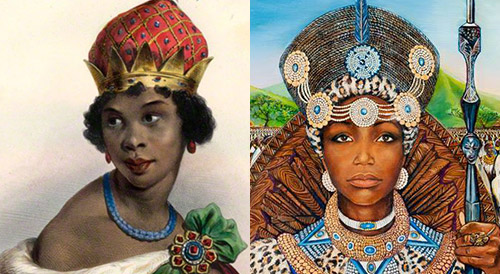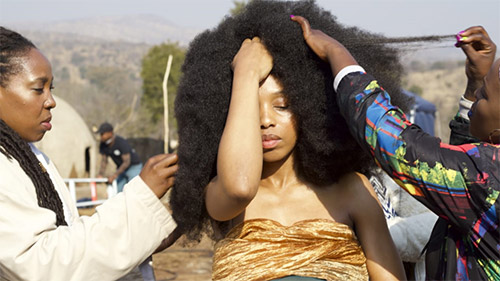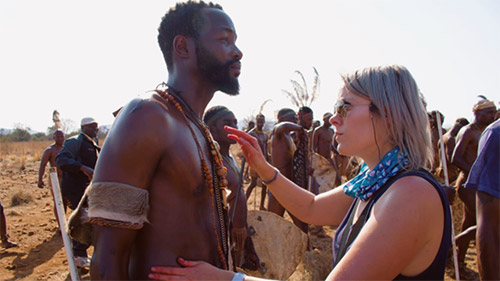Cast your gaze behind-the-cameras for the inside scoop on the making of Mzansi Magic's 20h00 Sunday night drama
Ifalakhe...
TVSA caught up with the show's Executive Producer and Director Mmamitse Thibedi of Stained Glass TV to find out what went into creating the series.
5,4,3,2,1 ACTION!...
Mmamitse
TVSA: What was the inspiration for the series? How did it come to be?
Mmamitse: Africa's place in history is often misrepresented, if not completely ignored. We wanted to create a show that would reflect an Africa that gave birth to powerful African kingdoms that influenced technology, architecture, fashion, science, religion, trade and politics.
For us, it is very important that we begin the archiving of our history within an aesthetic and narrative context that we identify with and believe to be true and accurately reflective of our people.
Stunt choreographer Master Dlamini (right) directs cast members (left to right): Ntando Mncube (Bhekile), Menzi Biyela (Mkonto) and Bheki Sibiya (Khombindlela).
TVSA: Where is it filmed? Did you film on location? Please give us insight into the filming set-up? Did the actors stay in caravans?
Mmamitse: We shot the show at a place called Africa Land in Broederstroom, Northwest. The place is about 50km from our Joburg office. It is a hiking and camping site and so some of the crew would camp there to avoid the long travel time.
Some of our on-set companions were baboons, monkeys and a lot of snakes. Shooting the show there proved to be both challenging and absolutely stunning.
TVSA: Is it set in a particular year?
Mmamitse: The show is set in pre-colonial Africa, though not in a specific time frame. For us, the most important aspect of the time was to reflect our existence before colonial invasion.
TVSA: What was the biggest challenge in creating the pre-colonial world of the show?
Mmamitse: There's very little real, tangible source material for pre-colonial Africa. Most of the images that have been recreated and photographed are post-colonial so we had to first start by researching, imagining and reconstructing a plausible reality and aesthetic based on Africa's technological, social, scientific and artistic advancement.
We had to study African kingdoms like the Malian empire, Timbuktu, Mapungubwe, The Great Zimbabwe, The Bakone Civilization, the Moors and many more to figure out how trade within the continent influenced our civilization.
 Illustrated interpretations of Queen Nzinga & Queen Nandi (Shaka's mother)
Illustrated interpretations of Queen Nzinga & Queen Nandi (Shaka's mother) It's reality embellished with our imagination. For example, factually our people used hide, fur and woven materials for clothing.
We had to imagine what elements from nature they may have used to dye and treat the materials, how colour would have been introduced into our fabrics. Which flowers, roots, ochres would they use?
Factually, our people mined gold. But in our imagination, we had to reproduce the type of jewellery they may have created out of that gold. We had to introduce other stones they would have mined and imagine how that would translate.
Factually, we've had some very influential and powerful women lead our people; Queen Nzinga, Queen Nandi, Mkabayi ka Jama, the Dahomey Warriors of Benin.
In our imagination, we had to figure out how those woman would translate in our world while staying true to the time and pre-colonial context.
TVSA: Does the series have any relationship to the series Uselwa which stopped filming half-way through 2018 as a result of a financial crisis? At the time it was rumoured that Stained Glass took over production on Uselwa and Ifalakhe is also an historical drama set in KZN so is there any relationship between the two shows?
Mmamitse: No, the series has nothing to do with Uselwa. We started pitching Ifalakhe to M-Net and the other South African broadcasters back in January 2017. Because of the size and ambitious nature of the show, it took a long time to get off the ground. Finally, in 2019, we were able to produce the show.
Ifalakhe is not a historical piece, it is a pre-colonial African fantasy. The narrative is not steeped in history but rather fantasy.
In 2018, Stained Glass was asked to facilitate and assess whether Uselwa could be rescued and unfortunately the project was in too much trouble to resuscitate.

 Ifalakhe co-creator Gugu Zuma-Ncube (Nyasha) and Ayanda Nhlangothi (Mvelenhle) with the make-up department's Lindiwe Ndlovu.
Ifalakhe co-creator Gugu Zuma-Ncube (Nyasha) and Ayanda Nhlangothi (Mvelenhle) with the make-up department's Lindiwe Ndlovu.
 Menzi Biyela (Mkonto), prepped by make-up HOD Ronwyn Jarret.
Menzi Biyela (Mkonto), prepped by make-up HOD Ronwyn Jarret.
TVSA: Who was the first person/people on the Ifalakhe set every day?
Mmamitse: First people on set are the unit department, art and wardrobe. Followed by the assistant directors, director and the rest of the team.
Manqoba
TVSA: Who was the biggest joker on set?
Mmamitse: I think our 1st Assistant Director Manqoba Mathunjwa was able to be funny and motivate the crew and cast when needed.
CUT!